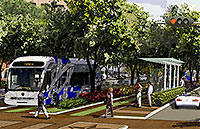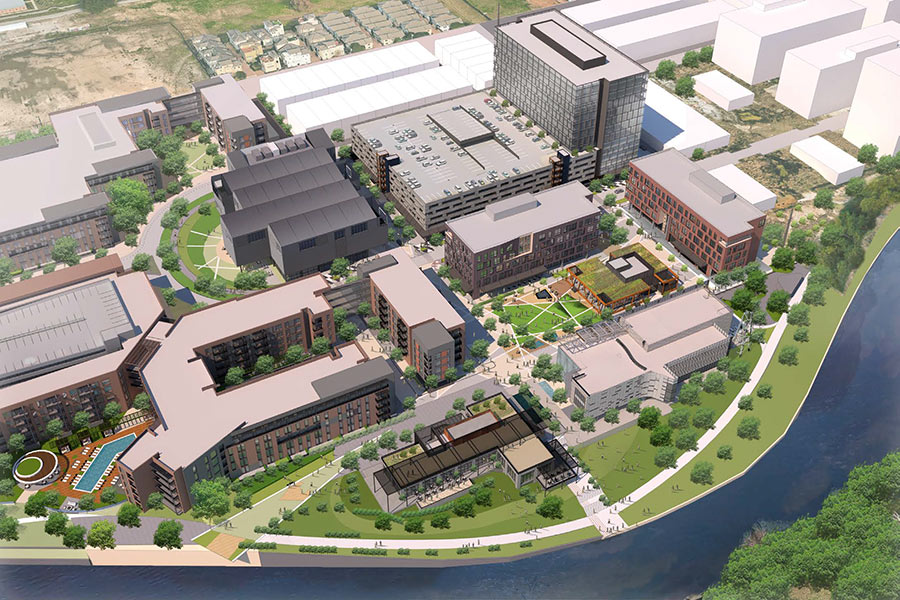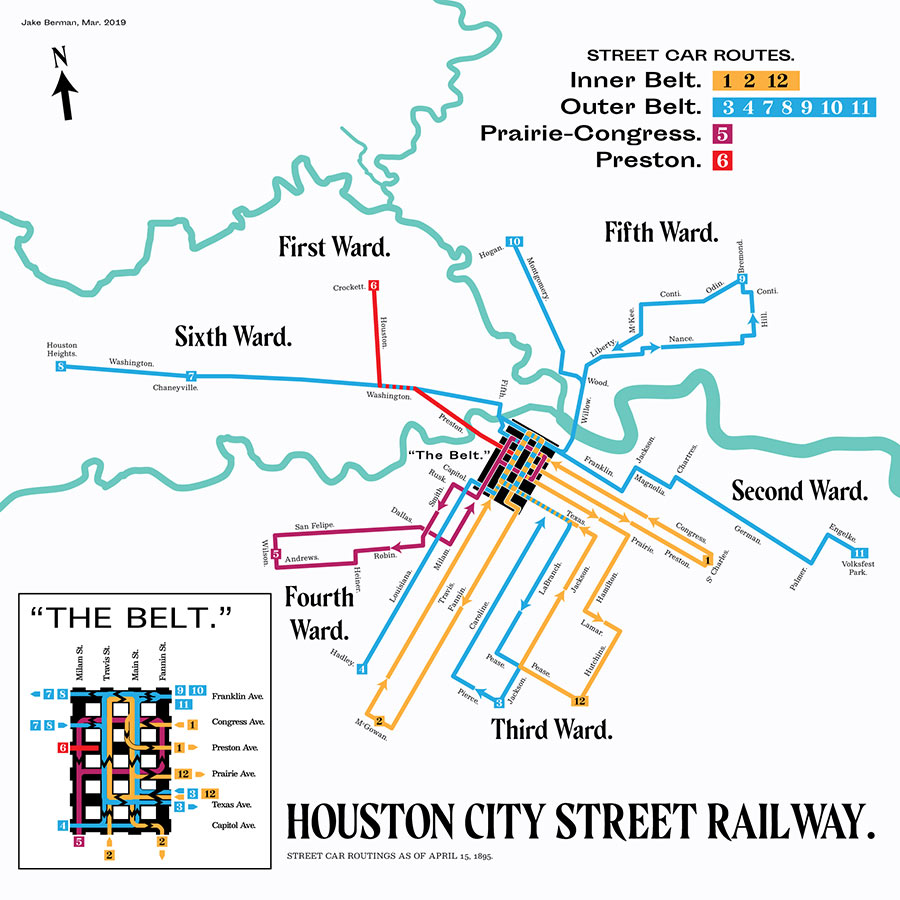FUNDING THE POST OAK BRT  Metro board chair Gilbert Garcia throws in his $.02 on Uptown Houston’s proposed Post Oak bus rapid transit system that Swamplot reported last month: “There are transit needs everywhere. We know all about them. But Metro’s resources are finite,” Garcia tells the Houston Chronicle‘s Dug Begley. “‘If we can solve the transit needs in this region without stretching Metro resources, like this does, that is great.'” The project is expected to cost $177.5 million, Begley reports, though TIRZ-powered Uptown Houston will pay up to $92 million of that. “The rest would come from $24 million in state transportation funds, and a $45 million grant from the Houston-Galveston Area Council, using federal money the region received,” Begley reports. And the buses could start running as soon as 2017. Uptown Houston’s president John Breeding adds, ‘”We’re the guys who put arches across the street. . . . We’re the guys who put giant granite balls from China at the entrances.'” [Houston Chronicle ($); previously on Swamplot] Image: Uptown Management District
Metro board chair Gilbert Garcia throws in his $.02 on Uptown Houston’s proposed Post Oak bus rapid transit system that Swamplot reported last month: “There are transit needs everywhere. We know all about them. But Metro’s resources are finite,” Garcia tells the Houston Chronicle‘s Dug Begley. “‘If we can solve the transit needs in this region without stretching Metro resources, like this does, that is great.'” The project is expected to cost $177.5 million, Begley reports, though TIRZ-powered Uptown Houston will pay up to $92 million of that. “The rest would come from $24 million in state transportation funds, and a $45 million grant from the Houston-Galveston Area Council, using federal money the region received,” Begley reports. And the buses could start running as soon as 2017. Uptown Houston’s president John Breeding adds, ‘”We’re the guys who put arches across the street. . . . We’re the guys who put giant granite balls from China at the entrances.'” [Houston Chronicle ($); previously on Swamplot] Image: Uptown Management District





Why doesn’t uptown just pay for the light rail.
Because BRT costs 90% less than light rail, John.
Which of course raises the question: why didn’t METRO just put in BRT everywhere they wanted to build rail??? The whole system could be finished and paid for by now. And guess what? BRT is BETTER than light rail. It’s faster and it costs less to operate.
The only answer is that the people at METRO are either wildly incompetent or they really don’t care at all about actually solving our transportation challenges. Take your pick.
Light rail is joke.
If anyone wants to learn about BRT, watch this: https://www.youtube.com/watch?v=CxmqyF5M_rw
Bernard, in what way is BRT faster? to construct? or getting people from place to place?
Construct, clearly. Moving people, No. If that is your claim I argue that you’ve never been on light rail or a BRT system. I think BRT in this case is the best thing that can be done, but it doesn’t move people more quickly than rail.
I’m in and out of the area on almost daily basis, vast majority of people come in and out by car and the parking although sometimes challenging is never a nightmare like it is in the Village or Downtown. For the life of me I can’t figure out what sufficient group of people would want to ride the Rail or BRT WITHIN that area.
BRT is too much like a ‘bus’, and buses are not an acceptable mass transit solution. They reek of blue collar; rail is the white collar answer. Repeat after me: ‘REAL CITIES HAVE RAIL’.
another money pit subsidized by taxpayers
benny, your car is a money pit subsidized by taxpayers. Who do you think pays for the roads you drive on. Have you noticed how much taxable property was destroyed recently for the 290/610 project? Do you think your taxes will go down due to that loss of tax base? Who is paying for the health problems from air pollution partly caused by cars? Don’t you pay taxes to Harris County for the hospital district? Just saying…think before you throw out that tired old wasted tax payer dollars stuff. It doesn’t hold up and never did.
Apparently buses – functioning as a sort of express BRT on the freeway HOV/HOT lanes – are acceptable enough for white collar office workers downtown. The office property owners care much more about the park and rides from the suburbs than they do about the urban light rail at this point.
The Uptown BRT is meant to hook into the same park and ride system that serves downtown. I’m willing to bet that there’s a not-insignificant number of office workers in Uptown who would be happy to get on one of those park and rides in the outer suburbs and avoid sitting in traffic, even if they have a “free” parking space in Uptown. This is dependent on having very frequent service on the Uptown BRT hitting the transfer points of the Northwest Transit Center and whatever gets built on Westpark, however. That’s where the real test will be – will high-frequency service actually be provided?
You’re wrong JC. BRT moves people faster than light rail.
You are clueless, Chef. Steel tracks and steel wheels are required for the state of the art mass transit system. Have you been on METROrail? It reeks of blue collar too.
@ sjh
I am against anything that needs govt to prop it up in order to get built, windmills, solar panels, rail lines built for a one week superbowl, pavilions shopping center in downtown homeless district, etc. Yes I do pay a large amount of taxes to the hospital district, but the few times Ive ever actually been to a hospital the people in the emergency room woerent there from lung cancer or mercury poisioning, theya re there from stabbings, gun shots, drug overdoses, getting beat up. Your tax subsidies to build Houston into Disneyland doesnt hold up. Ben
c’mon guys let’s just leave this matter to the guys with the giant granite balls.
The only way to make mass transit attractive to people is to make driving an unattractive option.
‘Reeks of blue collar’? That is perhaps one of the ugliest things I’ve read on here in a while. Putting aside the fact that most people working or studying in the medical center are not blue collar workers, could you please tell me how you became so high and mighty as to look down on others who choose to not drive either to save money, stop pollution, or avoid the hassle of rush hour traffic. If you don’t like living in a city–you know, where not everyone is wealthy–you could leave.
The trolling is strong on this one.
I currently work in the Galleria area and sometimes ride the route that this line would replace. This would cut down on my commute time quite a bit. I’m not blue collar. When I’m not riding the bus I drive a Ferrari… I’m just not above riding with people who are less fortunate than I am. My company is about to demolish our parking garage and re-build it to give us more space. I’ll be riding the bus everyday then. I can’t see how light rail would be any better for me than BRT. If it’s going to take until 2017 to get BRT imagine how long it would take to get rail. I’m not going to live forever. I don’t care if rail gets built after I’m dead.
@benny – If you’re against anything that requires the government to prop it up, you should be against roads above all else. Aside from a few toll roads, roads are 100% government funded through taxes. At least rails and busses have a chance to recoup some of their operating costs through fares.
“I’m not blue collar. When I’m not riding the bus I drive a Ferrari…”
+++
Comment Of The Day, please?
@benny “I am against anything that needs govt to prop it up in order to get built…”
You are familiar with how non-tolled roads are built, I assume?
:“I am against anything that needs govt to prop it up in order to get built…â€
Yeah! Fire departments should be constructed with the free market in mind! Potable tap water – FREE MARKET! Who here likes Traffic signals? no one? Privatize them suckers to the free market! Those with higher 401k’s get green lights all the way downtown!
/sarcasm
benny,
on a serious note, are you open to shutting down any and all governmental entities that are not operating as viable profit centers?
Mass transit vs. cars…it’s six of one or half-a-dozen of the other as far as I’m concerned. Nothing is more hilarious than a dude ranting about individual freedom while stuck on the parking lot that is the NW Freeway at rush hour.
Bernard, we can agree to disagree on speed. Rail accelerates faster and with the shorter distances that that line would require it would be faster than a bus.
I say we make every highway into a tollroad, and just watch the behavioral changes that are made. It would be an interesting experiment of human choice.
Yikes, lots of false information in these comments, lol.
BRT is neither fastor nor cheaper to operate than light rail. It is cheaper to construct, though. However it is nowhere close to “90% cheaper.”
BRT costs vary, depending on whether it’s at grade or grade seperated.
I believe that BRT is a very good option right now for Post Oak. Since we cannot afford the light rail now, BRT would be a good compromise. And, it would make it that much easier down the line when (if) the rail actually does get put in.
Wow, lots of misinformation on these comments as usual, lol.
BRT is neither cheaper to operate or faster than rail. It is cheaper to construct, but saying it’s “90% cheaper” is just silly and unrealistic.
Right now BRT is a good option for Post Oak. I’d like there to eventually be rail, but in the meantime BRT would increase transit usage in the area, as well as make it easier to construct light rail later down the line.
For park and ride users BRT could potentially be one less transfer than a LRT line. This is assuming the suburban bus’s route is allowed to use this special BRT lane and would be prohibited from driving on LRT tracks in the same spot.
Anyway the point I am making is that this really is a better and cheaper option for the specific set of circumstances.
There’s a very simple reason that trains are the preferred long-term solution over buses: fuel. The cost of gas continues to rise and will, long before a mass transit system becomes obsolete, run out. The trains run on electricity. In the long run, the fuel costs even it out.
There is also the public perception of trains vs. buses, as several of the comments here have shown: buses are seen to be lower-class and dirty, while trains are seen to be modern and clean. It’s a status symbol for a city now to have a good quality train system, and whether or not a BRT system would be more practical, others would still see it as a cheap, dirty alternative to something good. A proper LRT system throughout the city would increase the desirability of the city vs. others like New York or LA for things such as conventions or major sporting events. While they do come now, it would definitely be a huge plus to our city to have a functioning LRT system.
While a BRT system is at this point probably a smarter thing to pursue, we should still be working on building up the LRT system, as it would be a better long-term solution. I think the BRT is a perfect idea, as it allows all of the road widening work to be done now, and creates the space for the bus lanes, which can, in the future when METRO has the resources, have rails slapped down on them.
Yeah, I hate those stupid things that are propped up by the government too. Just the other day I found out the government spends our tax money of stupid water treatment facilities! As if a little cholera wouldn’t just make the kids stronger in the long run. Crazy socialism!
I drove down Post Oak today. What a mess!
Maybe they can put skirts over the BigRubberTires so it would look swankier.
We certainly should have built BRT before LRT…. but that’s 20 years ago. Point being, we are way behind in our mass transit infrastructure. I think Uptown BRT is a good solution considering the circumstances, but this city needs to get serious about mass transit or it will cost us in the long term.
We need to add BRT to Richmond and follow the same path METRO had originally planned for Light Rail. That would connect the inner loop even if it is all not LRT.
We would actually have connected mass transit. Take the light rail to the BRT system from Downtown to the Galleria without ever having to hop in your car… could actually be done in a feasible time if with BRT.
@ everyone,
I was under the impression that I pay taxes of about .25 per gallon of gas I purchase as do you all, and that this money was used to build and maintain roads???? Is this not the case?? The city of Houston spends 50% of its money on police and fire, is this is money collected from property taxes????? I never said I want to privatize everything, only that this rail/train down post oak is a money pit.
“The United States federal excise tax on gasoline is 18.4 cents per gallon and 24.4 cents per gallon for diesel fuel.[1][2] On average, as of January 2013, state and local taxes add 30.4 cents to gasoline and 30.0 cents to diesel, for a total US average fuel tax of 48.8 cents per gallon for gas and 54.4 cents per gallon for diesel”
What is this money used for? does anyone know? I was always under the impression it was to build and maintain roads.
@benny
I think you’ll find that the tax collected from fuel (gasoline and diesel) does not in fact cover all of the costs of road building and maintenance.
Benny, nationwide gas taxes only account for 51% of road expenditures, the remainder coming from other revenue streams. In Texas, zero percent of local and arterial roads are paid for by gas taxes. they are paid for by sales taxes and property taxes. Cars and roads are massively subsidized. You may argue that everyone benefits from those roads so it is a worthy subsidy. After all, people need to get to work and goods and services require transport. However, multilane roads for single occupancy vehicles are still a subsidy. The argument for subsidizing cars on roads amounts to “all of society benefits by enabling goods and services to be rendered and enabling people to engage in the broader economy.” That argument would apply equally to mass transit. Everyone benefits by enabling people to get to work, services, and engage in the broader economy. If you don’t believe that, then start writing your elected officials asking them to raise gas taxes by more than a dollar per gallon, which is what it would take for cars to pay their full costs of roads!
Last article I read said that because lawmakers haven’t approved any significant increases to the gas tax in the past few decades, barely 50% of road construction and maintenance costs are funded by the gas tax. The rest comes out of general operating budgets, meaning that roads are taking away money from schools, fire departments and police, to name a few.
Please don’t build anything without grade separation at Post Oak @ Westheimer. The intersection is severely congested as is to the point that it backs up I-610 in the middle of the day or on a weekend. And there are no alternative roads that will be able to pick up this much additional traffic if lanes are taken away.
ok you guys make some good points about gas taxes not covering the costs of building-maintaining roads. I guess this is why I drive a Tahoe since the roads in
houston are mostly potholes. My Ferrari just couldnt hold up!! lol